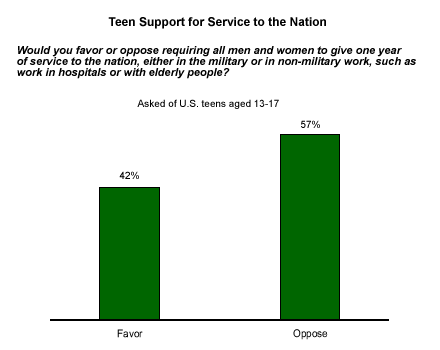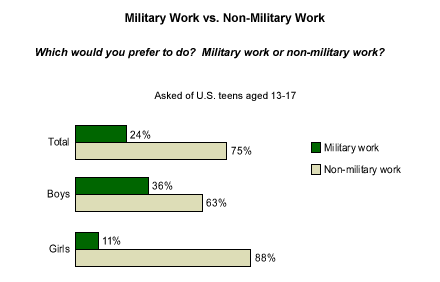Last year, the Universal National Service Act of 2003 was introduced in both the U.S. House and Senate. If passed, the act would require every American citizen between the ages of 18 and 26 to provide two years of service to the nation. In the language of the bill itself, participants would perform their service either 1) "as a member of an active or reserve component of the uniformed services," or 2) "in a civilian capacity that, as determined by the President, promotes the national defense, including national or community service and homeland security."
Although the bill has not progressed out of committee, how would American teenagers feel about performing required national service? A new Gallup Youth Survey* asked teens if they would favor or oppose requiring "all men and women to give one year of service to the nation, either in military or non-military work, such as work in hospitals or with elderly people." More than half (57%) of teens (aged 13 to 17) said they would oppose such a requirement, while a substantial minority, 42%, would favor it.

Influence of War
Although both the text of the National Service Act and the Gallup question encompass both military and non-military service, the current war in Iraq might dissuade teens from favoring a national service requirement. Understandably, any mention of required military service might instill fear in the minds of young people. The debate continues about whether the current U.S. military is large enough, and there is even some talk about reinstituting the draft. In a recent speech, Republican Sen. Chuck Hagel of Nebraska said that the country should "begin exploring its options" regarding mandatory military service.
The poll shows that teens are apparently unenthusiastic about the prospect of military service. When the question on national service was followed by one asking teens if they would prefer military or non-military work, just 24% said they would prefer military work, while 75% would choose non-military work.
Responses to this question vary by gender; just 11% of girls said they would like military work, compared with 36% of boys. Eighty-eight percent of girls and 63% of boys would prefer non-military work.

Political Divide?
The political divide over the war in Iraq raises another question: Does the orientation of young people toward national service have a political tilt? Both leading presidential candidates, George W. Bush and John Kerry, encourage national service on a voluntary basis. Kerry in particular targets young people with his "Service for College" initiative, in which he promises four years of public university tuition in exchange for "two years in one of America's toughest and most important jobs," such as helping educate children in troubled schools or helping improve homeland security.
With regard to the general idea of a national service requirement, support is roughly equal among teens who said they plan to vote Republican when they are old enough and those who said they plan to vote Democratic: 40% of future Republicans supported the idea, as did 37% of future Democrats (support among those who said they will be political independents was slightly higher, at 48%). However, teens who plan to vote Republican were more likely to prefer military to non-military service: 42% said they'd rather serve in the military, compared with 17% of both future Democrats and independents.
*The Gallup Youth Survey is conducted via an Internet methodology provided by Knowledge Networks, using an online research panel that is designed to be representative of the entire U.S. population. The current questionnaire was completed by 785 respondents, aged 13 to 17, between Jan. 22 and March 9, 2004. For results based on the total sample, one can say with 95% confidence that the maximum margin of sampling error is ±4 percentage points.